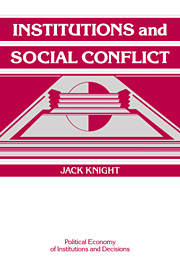Book contents
- Frontmatter
- Contents
- Series editors' preface
- Preface
- CHAPTER 1 INTRODUCTION
- CHAPTER 2 THE PRIMARY IMPORTANCE OF DISTRIBUTIONAL CONFLICT
- CHAPTER 3 INSTITUTIONS AND STRATEGIC CHOICE: INFORMATION, SANCTIONS, AND SOCIAL EXPECTATIONS
- CHAPTER 4 THE SPONTANEOUS EMERGENCE OF SOCIAL INSTITUTIONS: CONTEMPORARY THEORIES OF INSTITUTIONAL CHANGE
- CHAPTER 5 THE SPONTANEOUS EMERGENCE OF SOCIAL INSTITUTIONS: A BARGAINING THEORY OF EMERGENCE AND CHANGE
- CHAPTER 6 STABILITY AND CHANGE: CONFLICTS OVER FORMAL INSTITUTIONS
- CHAPTER 7 CONCLUSION
- Bibliography
- Index
CHAPTER 7 - CONCLUSION
Published online by Cambridge University Press: 16 September 2009
- Frontmatter
- Contents
- Series editors' preface
- Preface
- CHAPTER 1 INTRODUCTION
- CHAPTER 2 THE PRIMARY IMPORTANCE OF DISTRIBUTIONAL CONFLICT
- CHAPTER 3 INSTITUTIONS AND STRATEGIC CHOICE: INFORMATION, SANCTIONS, AND SOCIAL EXPECTATIONS
- CHAPTER 4 THE SPONTANEOUS EMERGENCE OF SOCIAL INSTITUTIONS: CONTEMPORARY THEORIES OF INSTITUTIONAL CHANGE
- CHAPTER 5 THE SPONTANEOUS EMERGENCE OF SOCIAL INSTITUTIONS: A BARGAINING THEORY OF EMERGENCE AND CHANGE
- CHAPTER 6 STABILITY AND CHANGE: CONFLICTS OVER FORMAL INSTITUTIONS
- CHAPTER 7 CONCLUSION
- Bibliography
- Index
Summary
What are the implications of a distributive conception of institutional emergence and change for the ways in which we think about social institutions? In the remaining pages I want to consider this question as a way of summarizing my analysis and arguments.
We started out with a set of questions about the social institutions in our everyday lives. Why do we have so many of them? Why does their basic structure differ across communities and societies? How do they develop and change? These questions are important for many reasons, but two are central here. First, their answers are crucial to our understanding of what happens in social life. And second, they are crucial to our assessments of what kinds of institutions we ought to have and whether or not our institutions manifest the goals and benefits by which we justify them. These are issues of explanation and justification, issues at the heart of our debates over the nature of the society in which we live.
EXPLANATION
Social institutions affect social life in many ways. Without them we would be unable to enjoy most of the benefits that we gain from acting in concert with others. They structure social life so as to produce collective benefits, variously characterized as gains from cooperation, coordination, and trade; functional and systemic needs; and so on.
- Type
- Chapter
- Information
- Institutions and Social Conflict , pp. 209 - 214Publisher: Cambridge University PressPrint publication year: 1992
- 1
- Cited by



